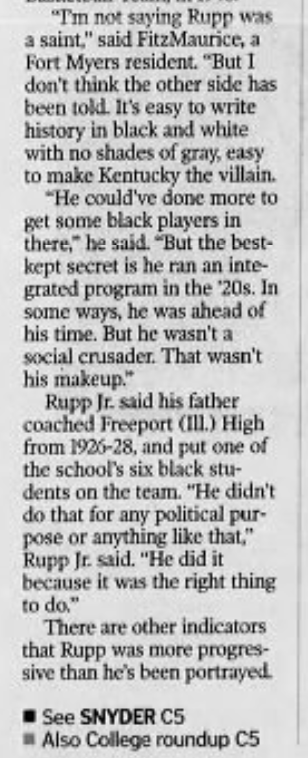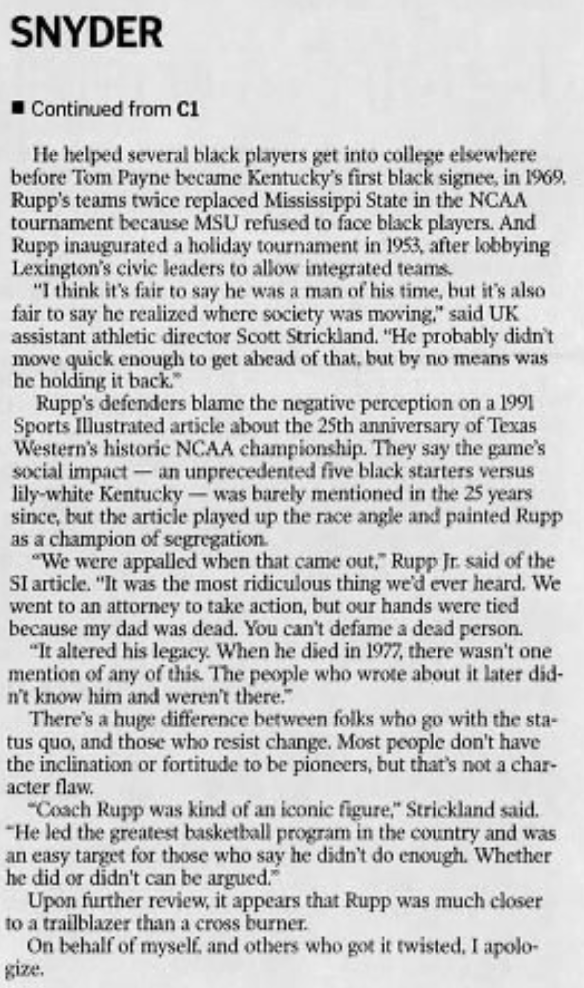In Truth, Rupp was trailblazer
By Deron Snyder The News-Press (Fort Myers, FL)
Published January 29, 2006
When I wrote that Kentucky's legendary Adolph Rupp "refused to recruit blacks or even schedule schools that did," I was repeating what I'd read, heard and accepted as fact for as long as I can remember.
Though my fingers paused momentarily, as I considered the gravity of the statement and wondered about its accuracy, I left it in the column on the movie "Glory Road" earlier this month.
But as Charles Webb of Cape Coral wrote, it was "sloppy journalism at its worst and totally unbecoming of your abilities."
He's right. I apologize.
"I can't say I'm angry," said Adolph Rupp Jr., asked about his dad's widespread characterization. "I just don't understand it, when it's so obvious that my father was not a racist."
Rupp Jr. is among those trying to alter the popular image of Rupp as a staunch segregationist, akin to George Wallace, Bull Connor and your typical Grand Imperial Wizard. A two-hour documentary, "Adolph Rupp: Myth, Legend and Fact," suggests that the coach has gotten a bad rap. His son is positive.
"I have a picture where my father appears to be the only white person in the audience," said Rupp Jr., 65. "He was the guest speaker at a banquet after Paris Western High School won the National Negro Basketball Tournament in the '40s or '50s.
"During the '40s, he put on coaching clinics at Kentucky State, a black college, and took players to demonstrate his plays," Rupp Jr. said. "My father and Kentucky's president tried to get the SEC to integrate in 1957 and again in 1961. Both times, they were unanimously voted down by other conference members. We got hate mail threatening bodily harm. There were editorials in papers throughout the South."
D.G. FitzMaurice, a sports columnist at The Lexington (Ky.) Herald-Leader from 1968-85, said Rupp recruited several black players without success, regularly scheduled games against integrated teams, and insisted that Don Barksdale become the first black on the U.S. Olympic Basketball Team, in 1948.
"I'm not saying Rupp was a saint," said FitzMaurice, a Fort Myers resident. "But I don't think the other side has been told. It's easy to write history in black and white with no shades of gray, easy to make Kentucky the villain.
"He could've done more to get some black players in there," he said. "But the best-kept secret is he ran an integrated program in the '20s. In some ways, he was ahead of his time. But he wasn't a social crusader. That wasn't his makeup."
Rupp Jr. said his father coached Freeport (Ill.) High from 1926-28, and put one of the school's six black students on the team. "He didn't do that for any political purpose or anything like that," Rupp Jr. said. "He did it because it was the right thing to do."
There are other indicators that Rupp was more progressive than he's been portrayed.
He helped several black players get into college elsewhere before Tom Payne became Kentucky's first black signee, in 1969. Rupp's teams twice replaced Mississippi State in the NCAA tournament because MSU refused to face black players. And Rupp inaugurated a holiday tournament in 1953, after lobbying Lexington's civic leaders to allow integrated teams.
"I think it's fair to say he was a man of his time, but it's also fair to say he realized where society was moving," said UK assistant athletic director Scott Strickland. "He probably didn't move quick enough to get ahead of that, but by no means was he holding it back."
Rupp's defenders blame the negative perception on a 1991 Sports Illustrated article about the 25th anniversary of Texas Western's historic NCAA championship. They say the game's social impact -- an unprecedented five black starters versus lily-white Kentucky -- was barely mentioned in the 25 years since, but the article played up the race angle and painted Rupp as a champion of segregation.
"We were appalled when that came out," Rupp Jr. said of the SI article. "It was the most ridiculous thing we'd ever heard. We went to an attorney to take action, but our hands were tied because my dad was dead. You can't defame a dead person.
"It altered his legacy. When he died in 1977, there wasn't one mention of any of this. The people who wrote about it later didn't know him and weren't there."
There's a huge difference between folks who go with the status quo, and those who resist change. Most people don't have the inclination or fortitude to be pioneers, but that's not a character flaw.
"Coach Rupp was kind of an iconic figure," Strickland said. "He led the greatest basketball program in the country and was an easy target for those who say he didn't do enough. Whether he did or didn't can be argued."
Upon further review, it appears that Rupp was much closer to a trailblazer than a cross burner.
On behalf of myself, and others who got it twisted, I apologize.






